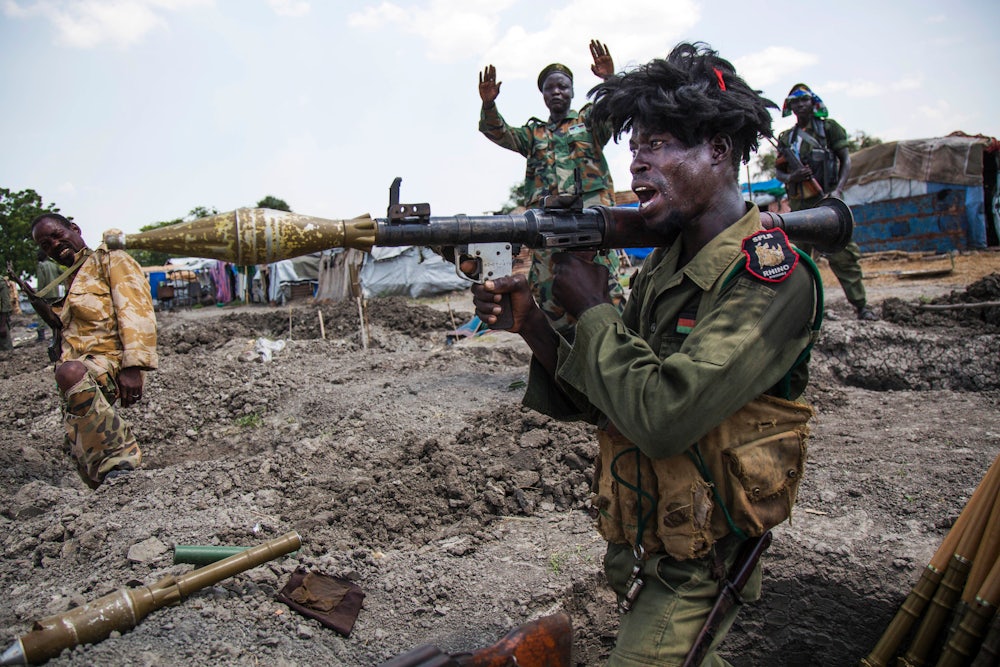Last month, after the United Nations Commission on Human Rights in South Sudan made a 10-day fact-finding visit to the war-torn country, chairperson Yasmin Sooka said that “the scale of rape of women and girls … is frankly mind boggling.”
“There is already a steady process of ethnic cleansing underway in several areas of South Sudan using starvation, gang rape and the burning of villages,” Sooka added. “The stage is being set for a repeat of what happened in Rwanda, and the international community is under an obligation to prevent it.”
That obligation will soon be on President-elect Donald Trump and the Republican-controlled Congress, as the civil war in South Sudan is “on the cusp of full-scale genocide,” according to a recent study from the Council on Foreign Relations. Entire communities have been displaced. Neighboring Ethiopia and Kenya strain to accept hundreds of thousands of women and children fleeing the violence, which has claimed at least 50,000 people.
If you don’t know much about the catastrophe, that’s because there has been little media and political attention to the war since fighting broke out in 2013. But the harrowing testimonies of terrified children hiding neck-deep in hazardous swamps, families burned alive in their homes, and neighborhoods reduced to ash ought to shock the conscience of our elected officials, even the most isolationist among them.
On the presidential campaign trail, Trump reasonably insisted that the U.S. shouldn’t entangle itself in complicated foreign conflicts that have little or no bearing on our national interest. His victory shows that the nation is in no mood for risky adventures abroad. But he and his supporters should be under no illusions what such a “realist” foreign policy means.
Not acting in South Sudan, as genocide looms, will be a moral litmus test not only of Trump’s leadership but indeed of the nation’s. If “make America great again” doesn’t include opposition to genocide, then what values define our greatness?
That rhetorical question is not meant to imply that the U.S. should intervene in all conflicts. Genocidal wars are unique because civilian populations, including children, are marked for unspeakable suffering and death.
American intervention, moreover, doesn’t have to mean entering this convoluted war with its 60 ethnic groups. Nor need it involve costly nation-building. There are other constructive, life-affirming steps that the U.S. could take immediately to alleviate some of the human misery.
The U.S. should increase aid and manpower at African refugee camps struggling to deal with the crisis. The U.N. Security Council can’t be relied on, because it is dragging its feet. And leaving these camps under the protection of U.N. peacekeeping forces doesn’t inspire confidence, given their recent performance. American muscle is needed to shield aid workers and rape victims.
We also should allow more South Sudanese families into the U.S., particularly the women and children who are most at risk. An estimated 2.2 million people have fled South Sudan in the past three years. On top of that, many South Sudanese civilians from previous wars still languish in the Kakuma refugee camp in Kenya. Accepting a portion of them would free up scarce resources for other families fleeing to the camps.
Recent campaign rhetoric about refugees sharply divided Americans. It should still be possible for liberal and conservative policy makers of good will to draft bipartisan strategies to assist South Sudanese migrants. Almost entirely Christian and animist, they’re escaping wars that are tribal, not religious; theirs is a local conflict, not a global crusade. The roughly 100,000 South Sudanese immigrants already in the United States haven’t brought their wars with them. Like the rest of immigrant America, they left the old world behind.
A fear of some refugee populations must not become grounds for indifference to all refugees. National greatness sometimes really does mean opening our hearts to the tired, the poor, the huddled masses yearning to breathe free. Particularly children trying to breathe in burned-out villages.
